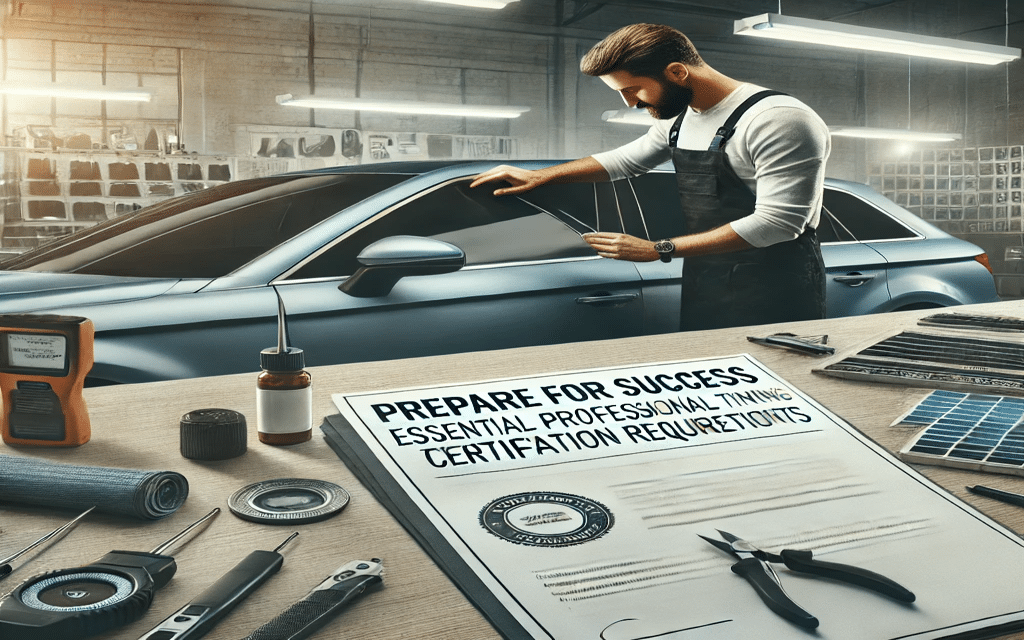In the USA, window tinting has become a trend. Sometimes, people need to drive cars due to medical conditions. People prefer to install window tints from a professional and certified tinting firm.
Moreover, an accredited company can better inform you about state laws and requirements for the front, back, and rear windows.
In some cases, people do this work by themselves. You can also do it for your car if you have proper training. This blog will guide you through the training and certification process of window tints. Could you keep reading to know more about it?
Certifications and Training Requirements
Do you dream of becoming a professional tinting expert? Or do you want to know the whole tinting certification procedure?
Buckle up; it’s more than just pasting some film on windows. It starts with the proper certifications and training.
Although getting training and certification is necessary and very crucial to show your expertise in this sector, you also need the right path to get this professional training. Here’s a fast-track guide to what you need to know and do.
Certification Process Overview
Getting certified in tinting means jumping a few hoops, but it’s worth it. Bodies like the Institute of Inspection, Cleaning and Restoration Certification (IICRC) set the bar. They’ve got the must-have criteria you need to meet (IICRC).
Here’s the lowdown:
- Training Programs: Expect to enroll in a formal training course.
- Skills Test: Show off your tinting skills.
- Performance Standards: Hit certain benchmarks to prove you know.
Your certification isn’t just a piece of paper; it’s your golden ticket to client trust and industrial acceptance. Clients are more likely to trust someone certified—and who doesn’t want that?
State-Specific Training Guidelines
Now, not every state plays by the same rules. The training you need can change based on where you live and work. Each state spells out the hours you need to train, what you need to learn, and whether hands-on learning hours count.
Take estheticians, for example. Most states ask for a least 600 hours of training. Those hours aren’t just filler but crucial for mastering the trade (Estheticians). You’ll likely need to pass the National-Interstate Council of State Boards of Cosmetology (NIC) exam too. Each state has its rules, so get familiar with the specific hoops you need to jump through.
Training timelines vary. You might wrap it up in a few months, or it could stretch out for years. It all depends on your state’s rules, how much time you can put in, and where you want your career to go. Stick to your state’s guidelines, put in those hours, and soon enough, you’ll be the go-to tinting pro in your area.
So, load up on the proper training, nail those exams, and let your certification talk. Your path to a shiny new career starts here.
Window Tint Laws: What You Need to Know
If you are thinking about becoming a window tint application pro, you must know all the rules and regulations of your state. Staying within the legal lines keeps you and everyone else safe on the road. Plus, it ensures you don’t have a surprise ticket.
What’s the Deal with Tint Darkness?
Each state has its own rules for how dark you can go. In Maryland, for example, you can tint your front windshield only up to 35%. And guess what? The back and rear side windows can also go as dark as 35%. But here’s a kicker – your front side windows? No tint is allowed unless you’ve got a medical reason. Talk about strict!
Also, your car windows must let in at least 70% of light through the windshield and front side windows. Why? It would be best if you saw the road, especially at night.
Tinted windows aren’t just about looking cool. Eye doctors suggest tinting to reduce UV rays that can harm your skin and eyes. Less glare means less eye strain, particularly on long drives.
Medical Reasons and Why They Matter
Some people have legitimate reasons to go darker on their tints. However, if you’ve got a medical condition that makes you extra sensitive to light, you might get an exemption on the tint laws.
Check with your state’s motor vehicle department to see if you qualify.
Good quality UV window film blocks up to 99.9% of harmful UV rays. This is crucial for keeping your skin healthy and young and saving your car’s interior from fading.
Wrap-Up: Stay Safe and Legal
You must know and follow the state’s rules whether you’re a pro in the tinting world or want your ride to look slick. Follow the law to keep yourself safe and trouble-free on the road. No one wants to be hit with fines or legal issues to cool windows.
Also, with a perfect window film, your clients display your expertise and become your business ambassadors. Do it right, and you’ll enjoy all the benefits without the hassle and get more satisfied and happy clients.

